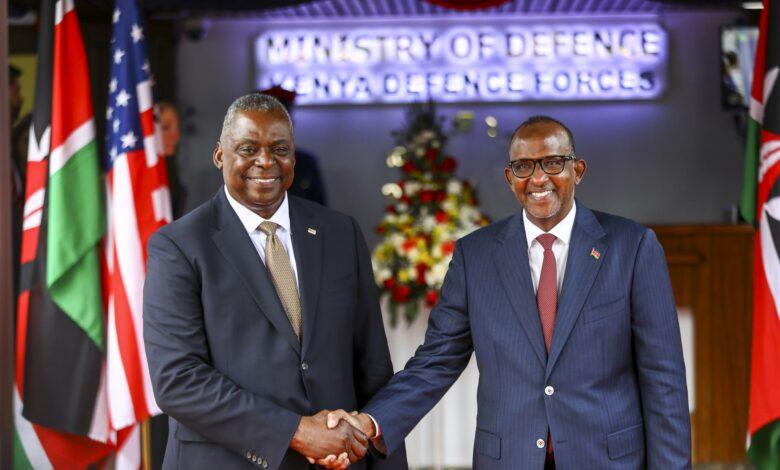
US calls for “maintaining momentum” in fight against Al Shabab in Somalia
US Defense Secretary Lloyd Austin stressed Monday the need to “maintain momentum” in the fight against the jihadist group Al Shabab in Somalia despite setbacks suffered by the country’s military, occasionally assisted by Washington troops.
“Our concern is that we have built some momentum and we want to maintain momentum,” Austin said Monday at a press conference in Nairobi with Kenyan Defense Minister Aden Duale.
The secretary visited the Kenyan capital as part of his first African tour, which kicked off Sunday in Djibouti and will conclude Wednesday in Angola.
“We know that progress is not always a straight line, so we may see things improve one day, and maybe we see challenges the next day,” he stressed.
Austin made these statements after the Somali government requested the postponement of the withdrawal of the African Union Transition Mission in Somalia (ATMIS) last week, which began with the gradual handover of its responsibilities to the national army earlier in 2023.
Thus, in a letter addressed to the UN, the Executive requested a “technical pause” of ninety days after “several major setbacks,” which forced Somali soldiers to withdraw from some recently recovered areas.
In Djibouti, the Secretary held a meeting with Somali President Hassan Sheikh Mohamud, who explained that he “needs more time” as he “faces the difficult task of maintaining pressure on Al Shabab while at the same time gathering forces to be able to remain effective.”
According to the US leader, Mohamud said that “substantial investment in other aspects, economic development, things that address the root causes of instability” is required in addition to military action.
Duale, for his part, announced the signing of a defense cooperation framework between 2023 and 2028, which “underscores” the “shared commitment to peace and security in the region and globally.”
ATMIS had about 20,000 uniformed personnel in Somalia, mainly from Uganda, Burundi, Kenya, Djibouti and Ethiopia.
On June 30, the mission completed its first withdrawal phase after the UN Security Council approved the departure of 2,000 of its troops before that date.
On September 18, the second phase began, which was to be completed with the departure of another 3,000 members before the end of the month.
This process coincides with an intensification of the Somali Army’s operations against Al Shabab after the Somali president announced in August 2022 a “total war” against the jihadist group.
Since then, the Somali Armed Forces, supported by ATMIS, have carried out intense offensives against the terrorists, sometimes with military collaboration from Washington.
Al Shabab, affiliated since 2012 to Al Qaeda, often perpetrates attacks in the capital, Mogadishu, and other parts of the country to overthrow the central government – backed by the international community – and install an Islamic state of Wahhabi (ultra-conservative) style.
The group controls rural areas in central and southern Somalia. However, the army recovered some of these territories in the last year. It attacked neighboring countries such as Kenya and Ethiopia.
Somalia has been in war and chaos since 1991, when dictator Mohamed Siad Barre was overthrown, leaving the country without an effective government and in the hands of Islamist militias and warlords.
Source » laprensalatina.com





